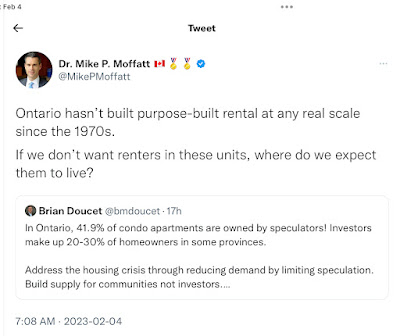Over on Twitter, I found the following comment:
He’s sort of right. A rental unit is a rental unit, and yes, people should be able to live there.
There’s a “BUT” to this, and it’s actually quite a large one. The problem is that speculator held properties are problematic for renters for a number of reasons. Most speculators are basically in it for the capital gain somewhere along the way. That means that they are constantly watching the market with an eye to when to sell so they can skim off their profits while someone else pays their mortgage costs for them (the renter).
This makes for rental homes that are inherently unstable. The owner could decide to sell at any time, or in the case of foreign held units, could decide that they want to live there when they come to Canada, and presto, the renter is out on their ear with very little recourse.
The point that I am making is that this actually creates a very serious problem for renters - you can’t be certain that you will have any kind of stability. This is extremely hard on people who are at the lower end of the income spectrum where they may already be struggling to pay the rent in the first place. Having an owner come along and say “whoops - time for you to move” is both upsetting, but also makes already touch-and-go lives even more precarious.
What we need to start talking about is the difference between financial speculation in real estate and long term businesses that manage and rent homes to people. The problems in our real estate rental markets are a combination of speculators, foreign owners buying a property to have an “anchor” in Canada, and a lack of political will to actually regulate the rental markets in a reasonable manner.
The business of residential rentals has as much to do with property value speculation as it does with providing a service that people need. These businesses can be, and often are, skating between speculation and rental as a business. The result being that renters often find their rents increase at the drop of a hat - “oh, I had to replace your fridge last month, your rent is now $50/month more”, or “I’m increasing your rent by $100 because I can”. On top of that, so-called “gig rentals” - short term rentals on platforms like Airbnb and VRBO often are more “profitable” for speculators, and they don’t have to deal with all of the complications of longer term rental arrangements - like leases.
The old idea in Canada has been that you rent for a while as you build up some savings so you can afford to buy a place. We tend to think of these people as young people “just getting started” - they are often students, and so on. But that is far from the full spectrum of renters out there - there are long term renters for any number of reasons, and they deserve stability in their lives too.
We need to re-think our approach to property, homes, etc. in this country. If we are going to continue to emphasize buying your own place, then the speculator part of the market needs to be better controlled, and the rental market should be subject to similar constraints to those on mortgages. Right now a mortgage on your primary home is restricted to ~35% of your income; rent on the other hand can be anything, and often is well over 50% of a person’s monthly income.
Again, this is one of those cases where the “long term” picture is that no market is perfect, and they almost always need some kind of reasonable regulation in place so that profiteering does not take over.

No comments:
Post a Comment